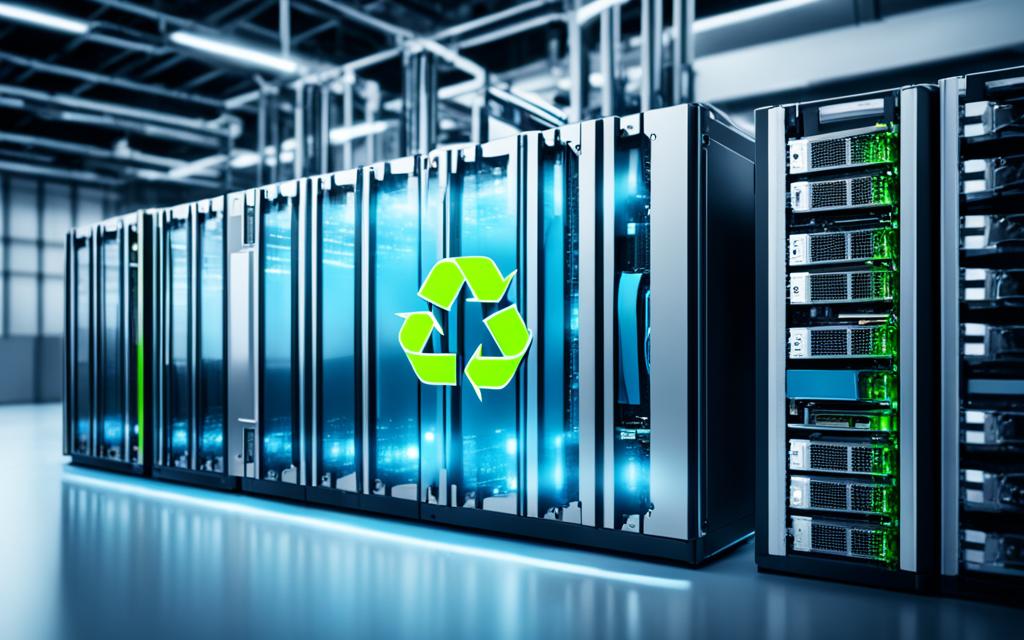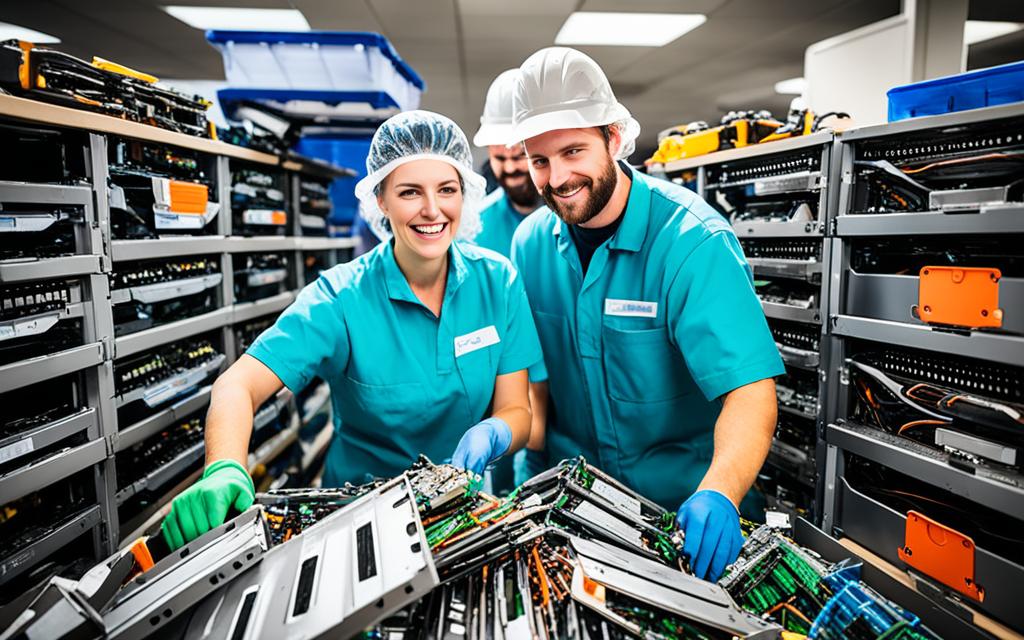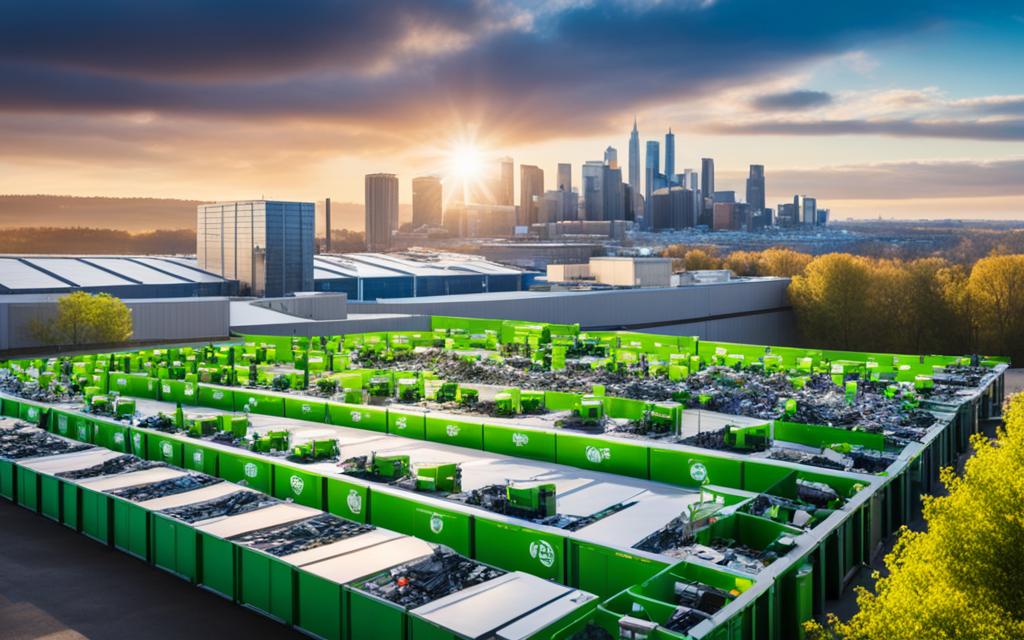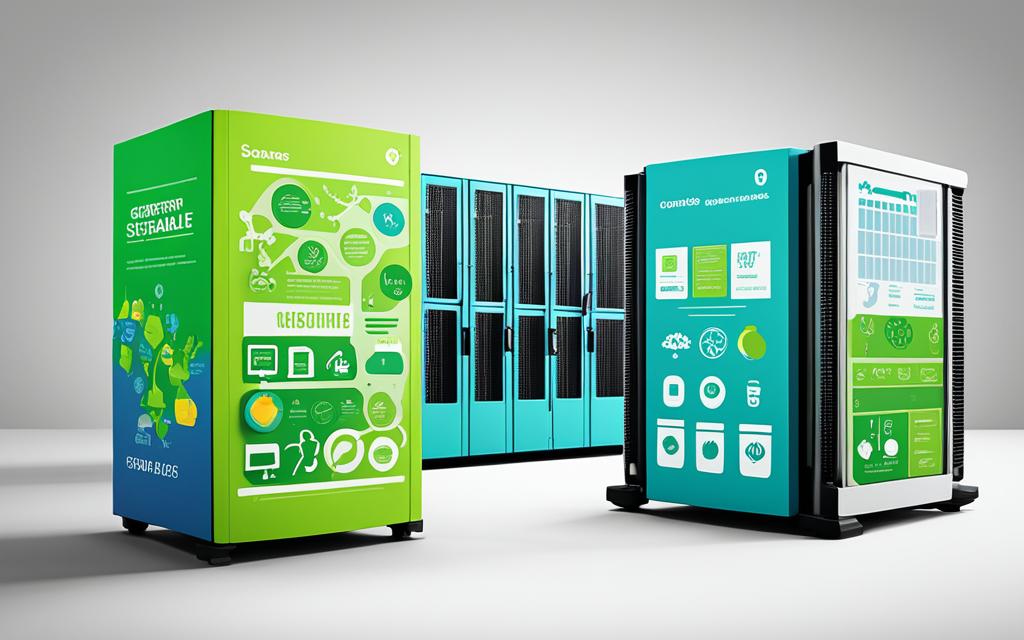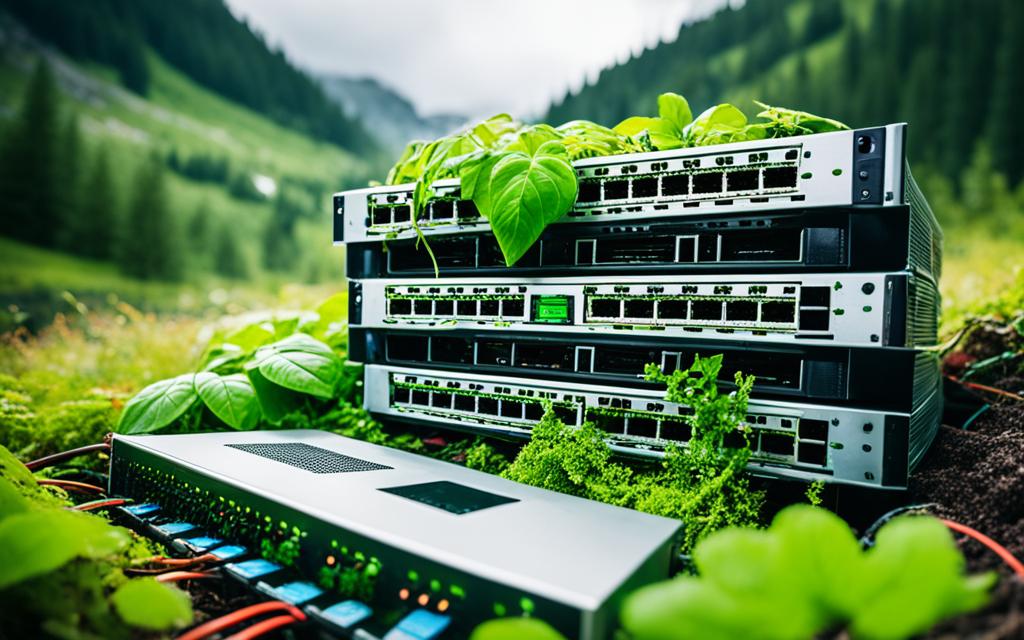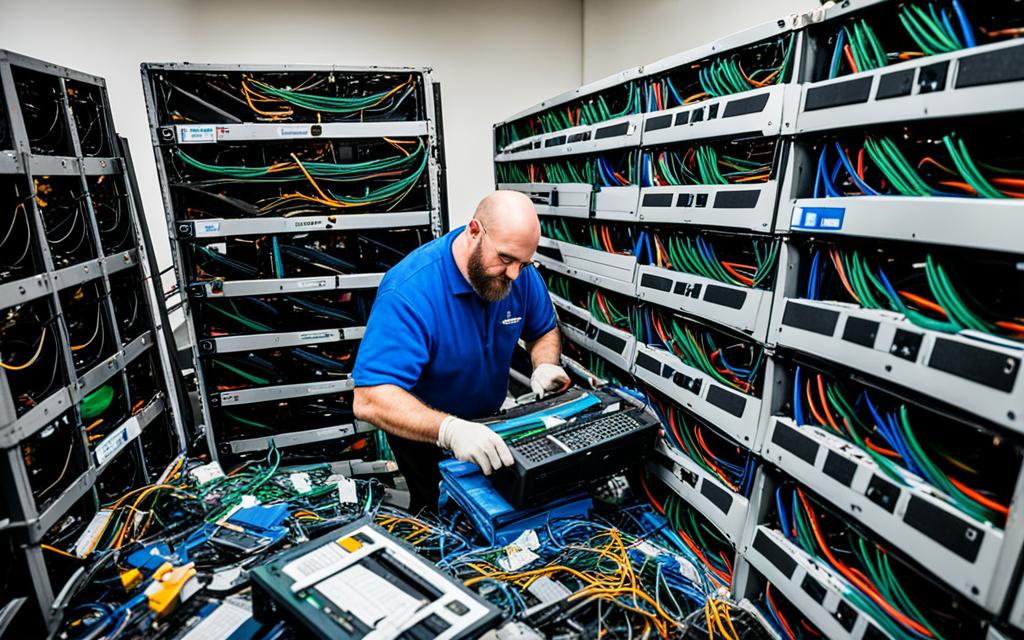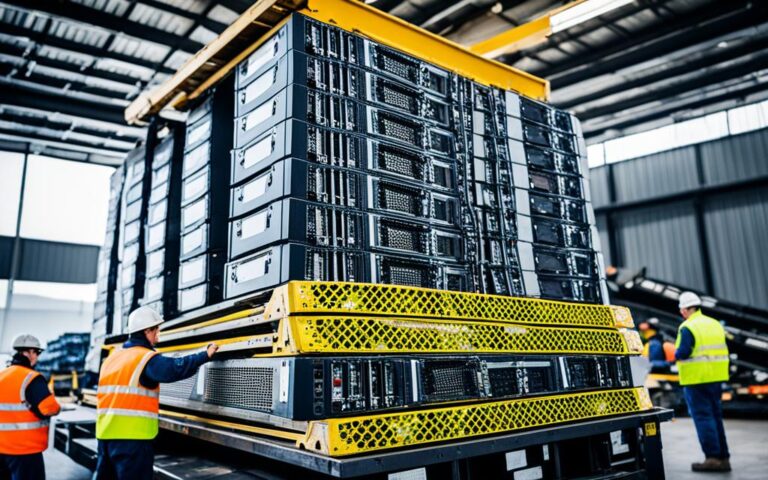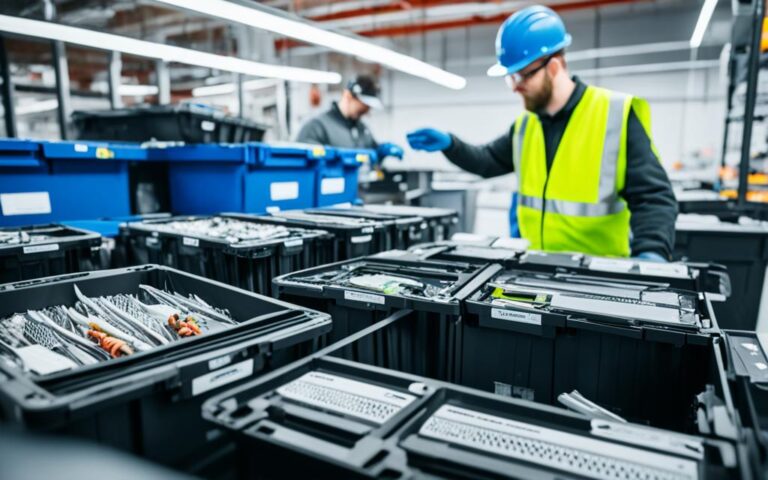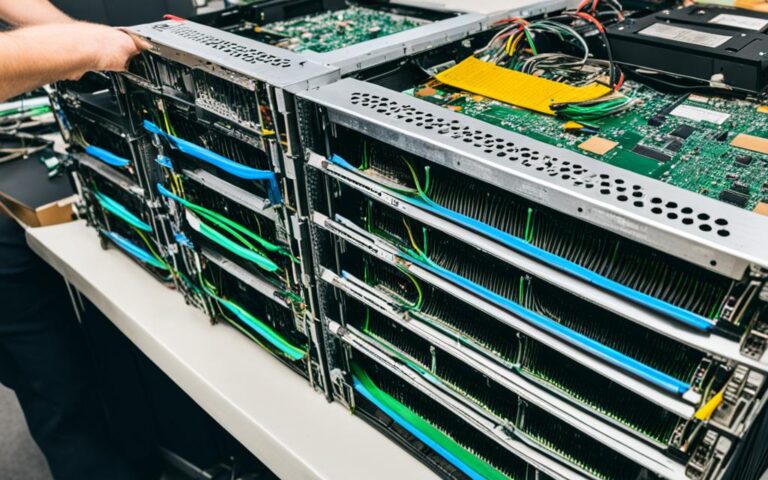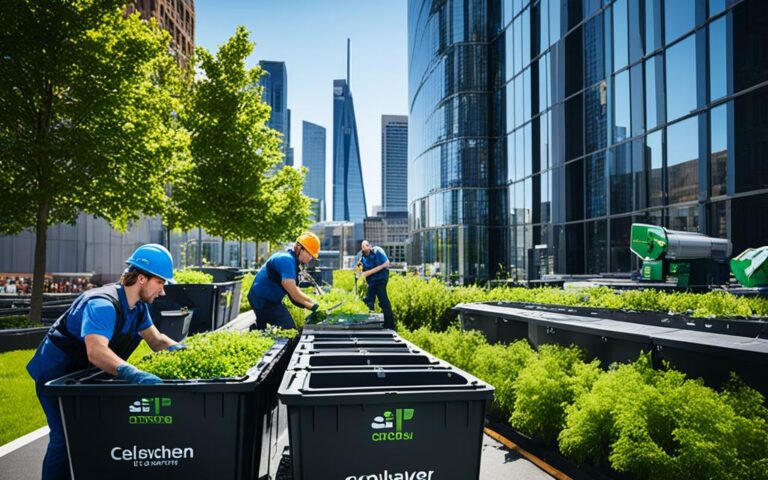Server Recycling: Opportunities for Innovation in the Tech Sector
The UK technology landscape is constantly evolving, driving innovation and shaping the future. As businesses strive for efficiency and sustainability, server recycling emerges as a key opportunity for the tech sector. By embracing server recycling practices, companies can not only reduce their environmental impact but also unlock new possibilities for innovation.
In today’s fast-paced world, technology quickly becomes outdated, resulting in a growing pile of discarded servers. This server waste contributes to environmental damage and increases the demand for new materials. However, by recycling servers, businesses can make a positive difference in the environment while conserving valuable resources.
Server recycling offers a sustainable solution by recovering precious metals like gold, silver, copper, and palladium that are found in these servers. These metals, which require resource-intensive mining processes, can be reused instead of extracting new materials from the earth. This not only reduces the environmental impact of mining but also conserves natural resources.
Moreover, server recycling provides an opportunity for businesses to recover value from their old equipment through buyback programs offered by recycling companies. This financial incentive encourages companies to recycle their servers rather than disposing of them, making server recycling a practical and sustainable business practice.
In addition to the environmental and financial benefits, server recycling helps companies comply with e-waste regulations. Non-compliance can result in hefty fines, making it crucial for businesses to partner with certified electronics recyclers.
By embracing server recycling, companies can contribute to the circular economy, where waste is reduced, and materials are kept in use for as long as possible. Refurbished server components can provide affordable hardware options for startups and small businesses, promoting accessibility and innovation within the tech sector.
In conclusion, server recycling not only addresses the urgent need for sustainability in the tech sector but also opens up opportunities for innovation. By adopting server recycling practices, businesses can drive efficiency, conserve resources, and make a positive impact on the environment. It is time for the tech sector to leverage server recycling and play a leading role in creating a more sustainable and connected world.
The Environmental Impact of E-Waste
E-waste is a rapidly growing global waste stream, with only a small percentage being properly collected and recycled. Within this massive waste stream, servers play a significant role due to their size and frequent replacement. The disposal of server waste contributes to the accumulation of electronic waste, posing serious environmental challenges.
One of the key environmental impacts of e-waste, including server waste, is the resource-intensive mining required to extract precious metals. Servers contain valuable materials such as gold, silver, copper, and palladium. Obtaining these metals involves destructive mining processes that deplete natural resources and contribute to habitat destruction.
E-waste, including server waste, contains precious metals that require resource-intensive and destructive mining processes, contributing to environmental damage and resource depletion.
However, recycling servers provides a sustainable solution to minimize the environmental impact of mining. By recycling servers, the demand for new materials is reduced, conserving precious natural resources and mitigating the destructive effects of mining. Through proper recycling, valuable metals can be recovered, reducing the need for further resource extraction.
Furthermore, server recycling also promotes the recovery of other reusable components such as CPUs, memory chips, and hard drives, which can be refurbished and resold. This extends the lifespan of these components, reducing the demand for new ones and conserving resources.
To visually illustrate the impact of e-waste on the environment, consider the following table:
| Environmental Impact | E-Waste | Server Waste |
|---|---|---|
| Resource-intensive mining | ✓ | ✓ |
| Habitat destruction | ✓ | ✓ |
| Depletion of natural resources | ✓ | ✓ |
| Conservation of resources | ✗ | ✓ |
As shown in the table, both e-waste and server waste have a significant environmental impact in terms of resource-intensive mining, habitat destruction, and resource depletion. However, server recycling can help mitigate these issues by conserving resources and reducing the demand for new materials.
By understanding the environmental implications of e-waste and the benefits of server recycling, we can make informed choices that contribute to a more sustainable future.
The Business Benefits of Server Recycling
Server recycling is not just an environmentally responsible choice but also a practical business decision. Firstly, it allows companies to recover some value from their old equipment through buyback programs offered by recycling companies. This financial incentive encourages businesses to recycle servers rather than throwing them away. Additionally, server recycling helps businesses maintain compliance with e-waste regulations, which often come with hefty fines for non-compliance. By partnering with certified electronics recyclers, businesses can ensure they meet their legal requirements while contributing to sustainability.
When companies engage in server recycling, they contribute to a sustainable business practice that aligns with global efforts to reduce e-waste. Instead of adding to the growing environmental burden, companies can play their part in conserving resources and minimizing their ecological footprint. By properly disposing of old servers through recycling, businesses demonstrate their commitment to responsible environmental stewardship.
Furthermore, server recycling promotes value recovery for businesses. Recycling companies often offer buyback programs that allow companies to receive compensation for their old servers, especially if the servers are in good working condition or contain valuable components. This not only helps offset the cost of upgrading or replacing servers but also provides an opportunity to recoup some of the initial investment.
Moreover, server recycling enables businesses to maintain compliance with e-waste regulations. Many countries and regions have implemented strict laws and regulations to govern the disposal and management of electronic waste, including servers. Non-compliance with these regulations can result in significant fines and reputational damage for businesses. By partnering with certified electronics recyclers, businesses can ensure they adhere to these regulations and avoid legal consequences.
Overall, server recycling offers compelling business benefits, including value recovery, compliance with e-waste regulations, and the opportunity to contribute to a more sustainable future. By embracing server recycling as a standard practice, businesses can make a positive impact on the environment while also protecting their bottom line.
Case Study: XYZ Tech’s Successful Server Recycling Program
XYZ Tech, a leading technology company, implemented a server recycling program three years ago to address the growing issue of e-waste and enhance their sustainability efforts. By partnering with a certified electronics recycling company, XYZ Tech not only achieved compliance with e-waste regulations but also managed to recover substantial value from their old servers.
Through the buyback program offered by the recycling company, XYZ Tech received financial compensation for their old servers, amounting to £100,000 in the first year alone. This monetary return helped offset the cost of upgrading their server infrastructure with newer and more energy-efficient models.
Moreover, XYZ Tech’s server recycling program earned them recognition for their commitment to sustainable business practices and environmental responsibility. This positive image resonated with their customers, employees, and stakeholders, enhancing their brand reputation and attracting environmentally conscious clients.
XYZ Tech’s successful server recycling program serves as an inspiring example of how businesses can benefit from implementing sustainable practices. By prioritizing server recycling, XYZ Tech not only reduced their environmental impact but also experienced financial gains and strengthened their position as a socially responsible tech company.
The Process of Server Recycling
Server recycling is a vital part of sustainable tech practices, ensuring the responsible disposal of old equipment and the conservation of valuable resources. Let’s take a closer look at the server recycling process and the steps involved:
1. Safe Removal of Hazardous Materials
The first step in the server recycling process is the safe removal of hazardous materials such as lead and mercury. Certified recyclers have the expertise and equipment to handle these substances safely, ensuring their proper disposal and minimizing the risk to human health and the environment.
2. Assessment of Reusable Components
Once the hazardous materials have been safely removed, recyclers assess the server for reusable components. CPUs, memory chips, and hard drives are some of the valuable parts that can be refurbished and resold. By extending the lifespan of these components, the need for new ones is reduced, promoting resource conservation and sustainability.
3. Responsible Recycling of Remaining Materials
After extracting the reusable components, any remaining materials are responsibly recycled. Materials such as steel, copper, and plastic can be recycled and used to create new products, minimizing landfill waste and reducing the demand for virgin materials. This step ensures that even the non-reusable parts of the server contribute to a more sustainable future.
By following these steps, server recycling not only eliminates the environmental impact of hazardous materials but also promotes the reuse of valuable components and the responsible recycling of remaining materials, contributing to a circular economy.
Server Recycling and the Circular Economy
Server recycling plays a vital role in the circular economy, a concept that focuses on reusing and recycling resources to create a sustainable and efficient system. By recycling servers, businesses contribute to waste reduction and open doors for innovation in the tech sector.
One of the key benefits of server recycling is the opportunity to refurbish and reuse server components. This process allows for the creation of affordable hardware options that benefit startups and small businesses. By utilizing refurbished server components, these companies can access cost-effective technology without compromising on quality or performance.
Furthermore, server recycling enables the production of new products using recycled materials. Instead of relying solely on virgin resources, the tech industry can leverage recycled server materials to reduce the demand for new materials. This not only conserves natural resources but also minimizes the environmental impact associated with the extraction and processing of virgin resources.
The circular economy approach encourages businesses to adopt sustainable practices like server recycling to minimize waste and maximize resource efficiency. By embracing circularity, companies not only contribute to a more environmentally friendly future but also create opportunities for innovation and cost savings. This shift towards a circular economy in the tech sector aligns with the global movement towards sustainability and addresses the pressing need for waste reduction and resource conservation.
“Server recycling allows businesses to contribute to a more sustainable future by reducing waste and conserving resources. It represents a significant step towards achieving a circular economy in the tech sector.”
Innovating for a Sustainable Future
As the world becomes increasingly reliant on technology, it is imperative for businesses to adopt sustainable practices to minimize their environmental impact. Server recycling not only reduces waste but also sets the stage for innovation. By repurposing server components and incorporating recycled materials into new products, the tech industry can drive advancements in both sustainability and technology.
Embracing server recycling unlocks a range of possibilities for the tech sector. It encourages the development of innovative practices, such as efficient resource management and closed-loop manufacturing, which enable businesses to operate sustainably while maintaining competitiveness.
Moreover, the use of recycled materials in tech products promotes consumer awareness and demand for eco-friendly solutions. By choosing products made from recycled server materials, customers play an active role in supporting the circular economy and driving further innovation in the tech industry.
The Power of Collaboration
For server recycling to fully realize its potential, collaboration among businesses, governments, and consumers is crucial. Governments can play a significant role in incentivizing sustainable practices and enforcing regulations that promote server recycling and the circular economy.
Businesses, on the other hand, can actively seek partnerships with certified recyclers and implement buyback programs to encourage customers to recycle their old servers. By working together, businesses and recyclers can increase the collection of end-of-life servers and ensure that the materials are effectively recycled and reused.
The collective effort of governments, businesses, and consumers is essential in driving the transition towards a more sustainable tech industry. Through server recycling and circular economy practices, the tech sector can lead the way in waste reduction, resource conservation, and innovation.
Sustainable Tech Practices for Addressing Environmental Impact
To address the environmental impact of the tech industry, sustainable tech practices are key. By implementing these practices, businesses can contribute to a more sustainable future while reducing their ecological footprint. Let’s explore the various sustainable tech practices that can help tackle critical environmental issues:
1. Reducing E-waste through Proper Recycling
E-waste, including outdated servers, poses significant environmental challenges. By prioritizing proper recycling methods, businesses can minimize the accumulation of electronic waste and prevent hazardous materials from ending up in landfills. Recycling servers allows for the recovery of valuable materials, minimizing the need for resource-intensive mining processes. This not only conserves natural resources but also reduces the overall environmental impact of e-waste.
2. Addressing Energy Consumption through Renewable Energy Sources
The tech industry is known for its high energy consumption. Adopting renewable energy sources, such as solar or wind power, can significantly reduce the carbon footprint associated with tech operations. By investing in renewable energy infrastructure, businesses can power their facilities with clean energy, decreasing reliance on fossil fuels and minimizing greenhouse gas emissions.
3. Tackling Water Consumption through Efficient Manufacturing Processes
Water scarcity is a global concern, and it is crucial for the tech industry to address its water consumption. Implementing efficient manufacturing processes that optimize water usage can help conserve this precious resource. By adopting technologies like water recycling, businesses can reduce their water footprint and contribute to sustainable water management.
4. Embracing the Circular Model for Reusing and Recycling Materials
The circular economy model promotes the reuse and recycling of materials, reducing the reliance on virgin resources. By embracing this model, the tech industry can extend the lifespan of products and components through refurbishment, repair, and reutilization. This approach not only reduces waste but also stimulates innovation and creates opportunities for the development of more sustainable products and services.
5. Implementing Green Data Centers that Prioritize Renewable Energy and Electronic Waste Management
Data centers are essential components of the tech infrastructure, but their energy consumption and electronic waste generation pose significant challenges. To address these issues, businesses can establish green data centers that operate on renewable energy sources. Additionally, implementing effective electronic waste management practices within data centers ensures the proper disposal, recycling, and reuse of server equipment.
Affirming Commitment to Sustainability
By adopting sustainable tech practices, businesses can play a crucial role in mitigating the environmental impact of the tech industry. These practices not only contribute to waste reduction and resource conservation but also pave the way for innovation and a more sustainable future. Through collaborative efforts and a collective commitment to sustainability, the tech sector can drive positive change and create a greener and more sustainable world.
Conclusion
Sustainability has become a necessity rather than an option in the tech sector. As the technological landscape evolves rapidly and the climate crisis intensifies, it is crucial to address the environmental impact of the industry. By embracing sustainable tech practices such as server recycling and the circular economy, businesses can not only reduce waste and conserve resources but also foster innovation.
Businesses in the tech sector must prioritize sustainability to meet not only regulatory requirements but also contribute to a more sustainable and connected world. By adopting sustainable tech practices, the industry can minimize its negative impact on the environment while driving innovation. The convergence of sustainability, innovation, and the circular economy creates a tremendous opportunity for businesses to lead the way in creating a more sustainable future.
By incorporating server recycling into their operations, businesses can reduce the demand for new materials, conserve natural resources, and recover value from their old equipment. Embracing the circular economy further enhances sustainability efforts by extending the lifespan of components and utilizing recycled materials to produce new products. These practices not only benefit the environment but also provide more affordable hardware options for startups and small businesses.
In conclusion, sustainability in the tech sector is not only about meeting environmental goals but also about driving innovation and embracing the circular economy. By prioritizing sustainable tech practices, businesses can contribute to a more sustainable future while maintaining their competitive edge in a rapidly evolving industry.
FAQ
How can server recycling benefit businesses in the tech sector?
Server recycling presents new opportunities for businesses in the tech sector to innovate while driving sustainability and efficiency. By recycling servers, businesses can conserve natural resources, reduce the demand for new materials, recover value from their old equipment, maintain compliance with e-waste regulations, and create affordable hardware options for startups and small businesses.
Why are servers contributing significantly to e-waste?
E-waste is one of the fastest-growing waste streams globally, and servers contribute significantly to this issue due to their size and frequent replacement. Servers contain precious metals such as gold, silver, copper, and palladium, which require resource-intensive and destructive mining processes.
How can server recycling help businesses?
Server recycling is not just an environmentally responsible choice but also a practical business decision. It allows companies to recover some value from their old equipment through buyback programs offered by recycling companies. Additionally, server recycling helps businesses maintain compliance with e-waste regulations, avoiding hefty fines for non-compliance.
What is the process of server recycling?
The server recycling process begins with the safe removal of hazardous materials such as lead and mercury, ensuring their proper disposal. Certified recyclers assess the server for reusable components such as CPUs, memory chips, and hard drives that can be refurbished and resold. Finally, any remaining materials are responsibly recycled to minimize landfill waste.
How does server recycling contribute to the circular economy?
Server recycling plays a vital role in the circular economy by reducing waste and creating opportunities for innovation. Refurbished server components can provide affordable hardware options for startups and small businesses. Additionally, recycled materials from servers can be used to produce new products, further reducing the need for virgin materials.
What are some sustainable tech practices for addressing the environmental impact of the tech industry?
Sustainable tech practices include reducing e-waste through proper recycling, addressing energy consumption through renewable energy sources, tackling water consumption through efficient manufacturing processes, embracing the circular model for reusing and recycling materials, and implementing green data centers that prioritize renewable energy and electronic waste management.

